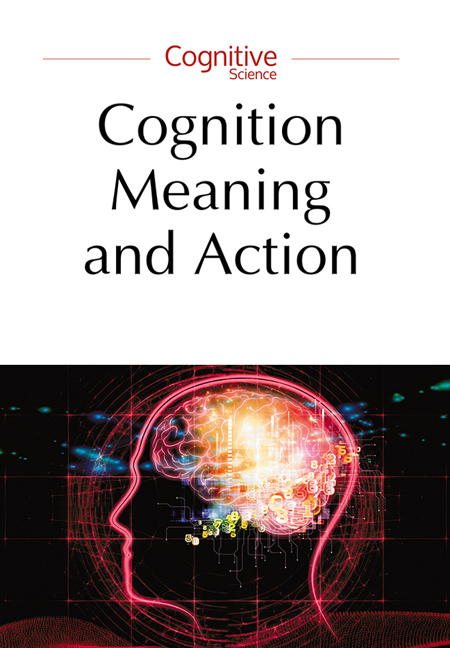Book contents
- Frontmatter
- Contents
- The crossroads of cognitive science
- Cognitive science: From computers to ant hills as models of human thought
- Two procedures expanding a linguistic competence
- Neurobiological basis for emergence of notions
- Similarity as distance: Three models for scientific conceptual knowledge
- The Approximate Numbers System and the treatment of vagueness in conceptual spaces
- Communication, cognition, and technology
- To tell and to show: The interplay of language and visualizations in communication
- Semiotics, signaling games and meaning
- Out of the box thinking
- The everyday of decision-making
- Short- and long-term social interactions from the game theoretical perspective: A cognitive approach
- Notes about Authors
Out of the box thinking
Published online by Cambridge University Press: 10 January 2018
- Frontmatter
- Contents
- The crossroads of cognitive science
- Cognitive science: From computers to ant hills as models of human thought
- Two procedures expanding a linguistic competence
- Neurobiological basis for emergence of notions
- Similarity as distance: Three models for scientific conceptual knowledge
- The Approximate Numbers System and the treatment of vagueness in conceptual spaces
- Communication, cognition, and technology
- To tell and to show: The interplay of language and visualizations in communication
- Semiotics, signaling games and meaning
- Out of the box thinking
- The everyday of decision-making
- Short- and long-term social interactions from the game theoretical perspective: A cognitive approach
- Notes about Authors
Summary
Introduction
If we accept that out of the box thinking is important, especially when hitherto existing solutions are applied to little avail, then understanding this process is also extremely important.
The primary observation here is that out of the box thinking is powerfully constrained by the very nature. In addressing this phenomenon we need to recognize that once the mind is furnished, it is difficult for it to entertain novelty. Viewing the situation through the metaphor of canyon and plain not only allows for an insight into this question but also offers a method of inducing a change.
Canyon
Fancy that you are moving along some deep canyon and all you can see are its walls of stone. You feel safe inside and just follow the unique direction possible.
As much evidence shows, some part of human thinking may be compared to torrents flowing in deep canyons. And as in a real ravine the visual perspective is confined by its slopes and one can follow the only path, similarly, the train of thoughts is limited to the most easily accessible and immediate “pathways” without perceiving the possibility of choice or change. These are real thinking canyons, i.e. most deeply rooted and long-standing beliefs, attitudes, and opinions. They are the last to be changed. They play the role of a censor sometimes causing a cognitive dissonance, for example, a person who is asked to write an article defending views contrary to their own and paid a negligible amount of money experiences cognitive dissonance and to avoid it starts to agree with what he/she has written. Thus, their prevailing canyon: I am rational, remains unaltered. Even Einstein succumbed to the canyons (he was convinced that the universe cannot change) and added a cosmological constant to stop the expansion (or contraction) predicted by his own relativity theory.
The question about the source of such canyons has at least two complementary answers.
First, this feature of thinking seems to be strictly connected with the traits of our memory, but not, which should be emphasized, with any memory impairment.
- Type
- Chapter
- Information
- Cognition, Meaning and ActionLodz-Lund Studies in Cognitive Science, pp. 153 - 168Publisher: Jagiellonian University PressPrint publication year: 2015



